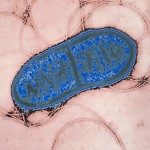Présentation
Bacteria are constantly challenged by bacteriophages, the most abundant microorganism on earth. In response, they have evolved an impressive variety of immunity mechanisms to resist bacteriophage infection. From restriction enzymes to CRISPR, these anti-viral systems have a long history of biotechnological applications. CRISPR are the adaptive immune system of prokaryotes. They are able to capture pieces of DNA form phages, and then use this memory to destroy homologous sequences thanks to the action of RNA-guided nucleases. These programmable nucleases have been the focus of many biotechnological applications, including genome editing and control of gene expression. We have also shown that directing Cas9 to cut in the chromosome of Bacteria kills the cell. We used this property to develop RNA-guided antimicrobials that rely on the injection of a CRISPR system programmed to target antibiotic resistance or virulence genes in Bacteria. Through this strategy we can eliminate a target group of strains within a species while leaving the rest of the population intact. More recently, we have uncovered a novel phage defense system in Staphylococci. This defense pathway relies on a kinase (Stk2) which triggers cell suicide when a specific phage protein is detected. Through this altruistic strategy, Stk2 prevents the phage from propagating to neighboring cells. We are now investigating the possible use of Stk2 as an antimicrobial target.
A CONFERENCE ORGANIZED BY THE SCIENTIFIC COUNCIL

